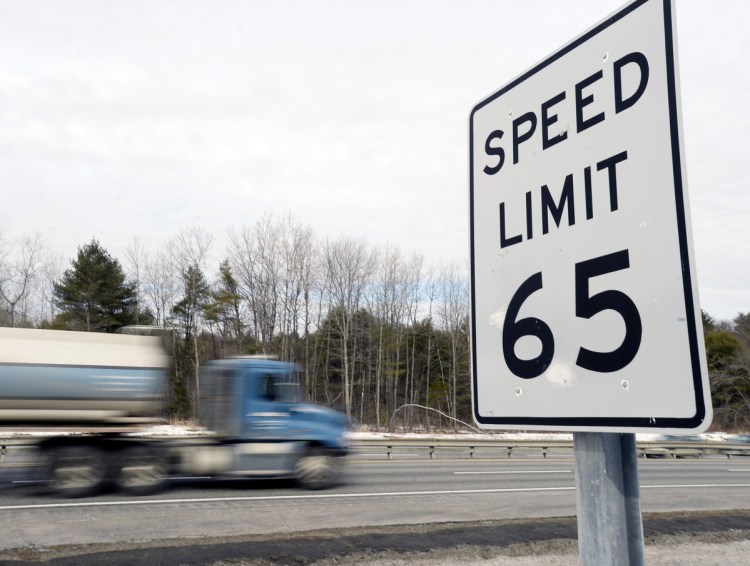Traffic fines for most speeding violations in Maine are going down thanks to the chief judge of the Maine District Court and a study that was conducted by the state agency responsible for collecting speeding fines.
The reduction in fines – about a 15 percent decrease – took effect Monday following a study by the Maine Judicial Branch Violations Bureau.
The study was done to see how Maine’s speeding fines compared to those in other New England states. The study determined that Maine’s fines for some of the lower-end speeding infractions were higher than those in neighboring states, according to a report by News Center Maine (WCSH/WLBZ).
Some in the law enforcement community believe the move also was prompted by the perception that officers were reluctant to write tickets that would be a financial burden on a low-wage earner.
Maine Department of Public Safety spokesman Steve McCausland said Chief Judge Susan Oram of the Maine District Court system recently approved the new set of speeding fines.
“On average, the fines for the lower-tier infractions dropped by about 15 percent,” McCausland said, adding that the changes are immaterial to state troopers. “We don’t set the fines. We only enforce speeding laws.”
Fines are collected by the Violations Bureau, which acts as a division of the Maine Judicial Branch, McCausland said.
According to the Maine Judicial Branch’s 2017 Annual Report, revenue collected by the state for speeding tickets has been declining steadily since the 2013 fiscal year.
In 2013, the state collected $10.7 million compared to $10.1 million in fiscal 2015, $9.3 million in fiscal 2016, and $8.6 million in fiscal 2017. The state attributes the decrease to a decline in the number of traffic infractions filed in the courts.
‘IT’S ALL ON THE POLICE OFFICER’
The new schedule of fines, which is posted on the Judicial Branch’s website, shows that drivers ticketed for going 1 to 9 mph over the speed limit will see their fine decrease from $134 to $114.
For those drivers caught exceeding the speed limit by 10 to 14 mph, the fines will drop from $152 to $129, and for drivers operating 15 to 19 mph over the speed limit the fine falls from $200 to $170. Fines will remain the same for drivers who are caught going 20 to 29 mph above the speed limit.
Under the fine schedule approved by Oram, high-speed violators will pay a fine that can range between $230 and $278.
Robert Schwartz serves as executive director of the Maine Chiefs of Police Association. He supports the decrease in fines for several reasons.
“It appears to be the right thing to do,” Schwartz said Monday evening. “People will hopefully learn from their mistakes, pay the fine, and remember to be conscious the next time they find themselves exceeding the speed limit.”
Schwartz said members of Maine’s law enforcement community became concerned when speeding fines were increased a few years ago. He said those fines contained a 10 percent surcharge. Police officers told him that it was hard issuing a speeding ticket to someone working for minimum wage.
“When you’re earning minimum wage and you’ve got a family to support, these fines can add up to a lot of money,” he said.
As a result, officers began using their discretion as to whether a driver should get a warning instead of a ticket. Schwartz said that approach to punishing speeding violators likely led to a decrease in traffic fine collections.
“Police officers started looking at some of the fines and said, ‘That’s a lot of money,'” Schwartz said. “Guess who takes all the grief for a speeding fine. It’s all on the police officer.”
OFFICERS USE DISCRETION
A small percentage of the fines collected go toward supporting training at the Maine Criminal Justice Academy and county jails, Schwartz said, stressing that none of the fines collected are given to individual police departments – a common misconception.
Schwartz is not sure what drove the speeding fine reduction effort. The Maine Chiefs of Police Association was not consulted.
John Smith, who manages the Maine Violations Bureau, declined to comment Monday.
Sen. Bill Diamond, a Windham Democrat who serves on the Legislature’s Criminal Justice and Public Safety Committee, said the issue of decreasing speeding fines did not come before his committee in the last legislative session.
Diamond said he heard the same rumblings as Schwartz, that officers were issuing more warnings than tickets because they felt the fines were too high.
South Portland Police Officer Ryan Le told News Center Maine that higher fines can make it difficult for some officers to write tickets.
“A lot of time if I stop someone for speeding and the fine is really high, we try to help them by reducing to a lower bracket,” Le told the television station.
Le said that he uses discretion when given the choice of writing a speeding ticket or issuing a warning. His decision will depend on several factors including a person’s driving record and their behavior during the traffic stop.
Dennis Hoey can be contacted at 791-6365 or at:
dhoey@pressherald.com
Send questions/comments to the editors.




Success. Please wait for the page to reload. If the page does not reload within 5 seconds, please refresh the page.
Enter your email and password to access comments.
Hi, to comment on stories you must . This profile is in addition to your subscription and website login.
Already have a commenting profile? .
Invalid username/password.
Please check your email to confirm and complete your registration.
Only subscribers are eligible to post comments. Please subscribe or login first for digital access. Here’s why.
Use the form below to reset your password. When you've submitted your account email, we will send an email with a reset code.